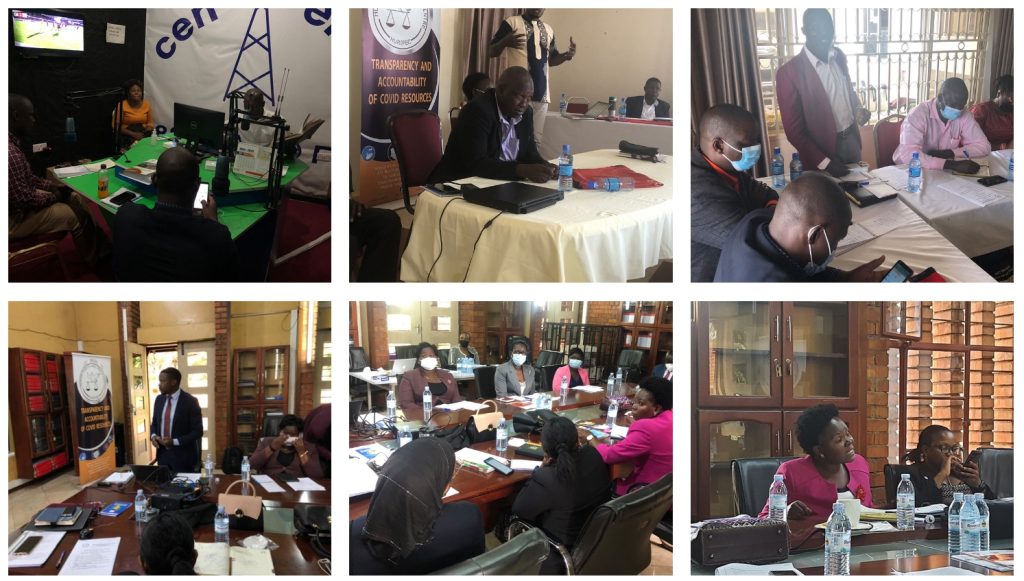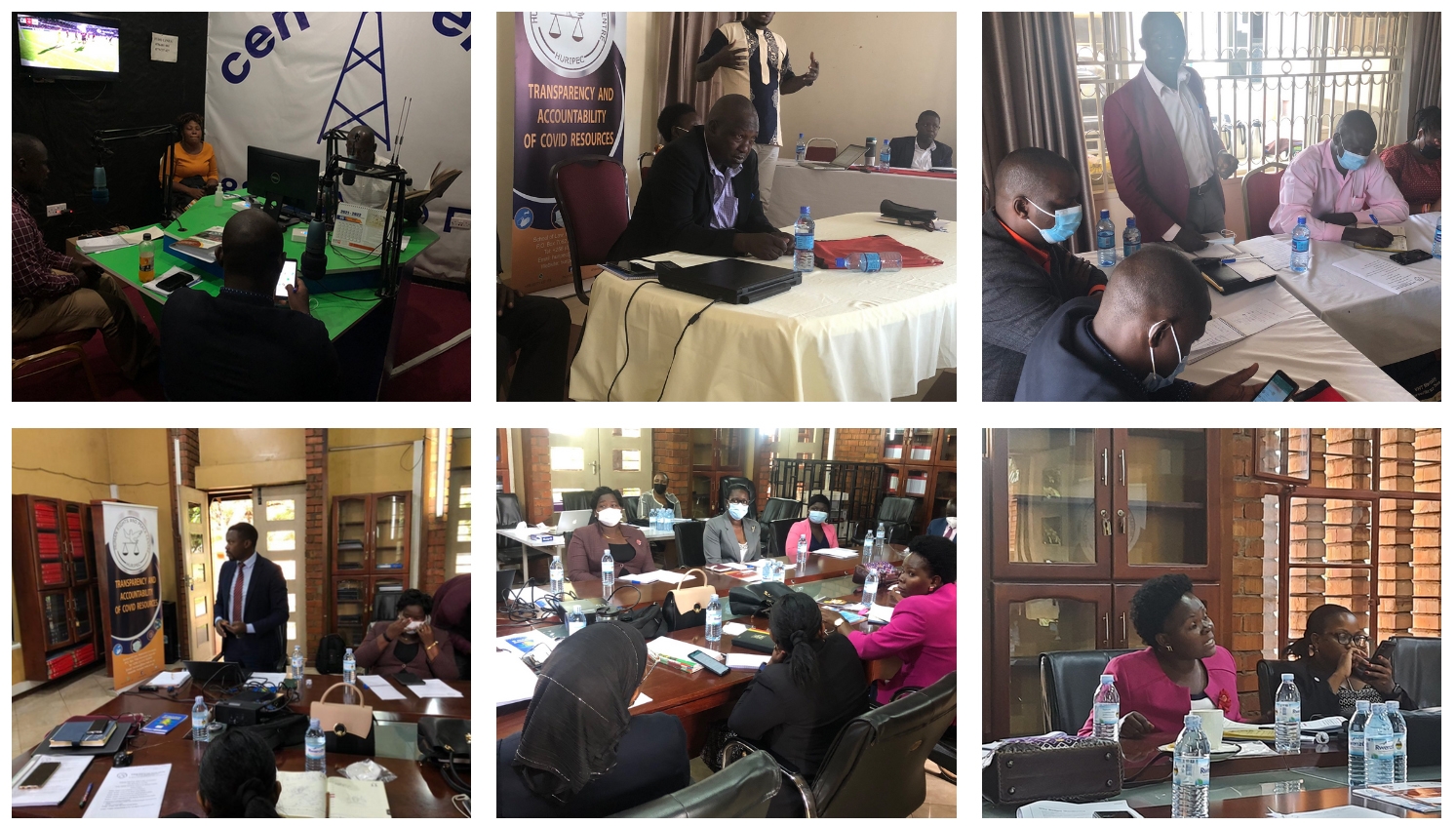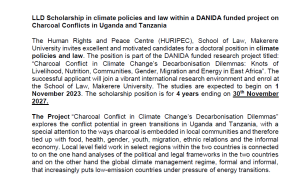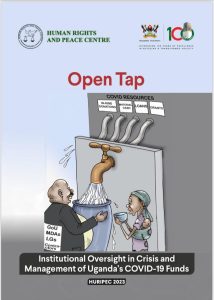
The Advocacy for the Accountability of COVID-19 Funds
“We have never been in a better position to end COVID-19 as a global health emergency…The number of weekly reported deaths is near the lowest since the pandemic began; And two-thirds of the world’s population is vaccinated, including 75% of health workers and older people,” World Health Organization Director-General, Dr Tedros Adhanom Ghebreyesus said on 23 September 2022 during the UNGA UNSG-hosted event: “Ending the pandemic through equitable access to COVID-19 vaccines, tests and treatments”
The ministry health statitics too indicate that by 2nd August 2022, zero Covid death with only 25 new cases registered. Only five people were indicated as admitted in health facilities. According to John Hopkins University Corona Virus Resource Centre, Uganda has not registered any Covid 19 related death between July and August 2022. Similarly, Our World in Data, an organization that collects data from various sources indicate similar results as of October 9, 2022.
The WHO Director’s statement is a sigh of relief. The statistics are impressive and the less pronouncements from the government on Covid-19 is an indicator that the era of fear, panic and lock downs because of the pandemic is slowly getting behind us.
Underneath this joy, lies a lot of unresolved issues around the transparency and accountability of the hefty financial resources that were invested in not only containing the virus but in 22 other sectors including the health infrastructure, research, food relief, education, support to SACCOs, information dissemination, development of industrial parks among others. Fundamental questions still linger around the allocations of public meager resources whether they met the country’s objectives, priorities and if the input matches the output.
The government, since March 2020, has provided more than four trillion shillings in three financial years specifically on Covid-19 related expenditure. Over one trillion of this money was spent on health-related issues, more than two trillion spent on economic support interventions through the stimulus package while one hundred sixteen billion was directed to social protection.
Additionally, government received two trillion US dollars in loans, grants, cash and in-kind from various development partners according to a report on Public Debt, Grants, Guarantees and Other Financial Liabilities for Financial Year 2O21/22. One trillion and above was on-budget support of which 198 million US went to health and the rest to accountability and education. US $ 936 millions dollars came in as off-budget support of which 736 million dollars went to ministry of health for media monitoring.
Parliament inquires
Parliament, in exercising its oversight role, through various accountability committees has produced adopted four reports regarding management of Covid-19 funds. Recommendations to the executive have comprised a call for full accountability of public resources that were mishandled but no response has come through.
For example, the Parliamentary Task Force on National Covid-19 Response discovered lack of transparency in the management of 1.61 trillion shillings meant for the recapitalization of Uganda Development Bank (UDB), lend a hand to support small and medium enterprises affected by Covid-19, to support the youth through the youth fund and women via the Uganda Women Entrepreneurship Program (UWEP) and Emyooga. The Committee noted that although the intervention was well intentioned to boost the private sector to withstand the Covid effects, it was “affected by lack of a transparent mechanism to ensure that the resources trickle down to the intended beneficiaries.” Parliament recommended that government, through ministry of finance submit full accountability of money including the list of beneficiaries. To-date, government has not complied.
In an interaction with several local government leaders in the four sub-regions of Buganda, Acholi, Teso and Ankole, HURIPEC found out that many SACCOs listed as beneficiaries, were not known to the alleged recipients. For example, many journalists SACCO in Greater Masaka, that “received” support such as Kabonera Journalist SACCO, were alien to the media practitioners. In Soroti, journalists were in shock to learn money had been disbursed to their association. A Special Audit report by the Auditor General??? of January 2022, shows a number SACCOs across the country which benefited from this intervention but it was difficult to verify its existence among them allegedly for journalists.
The Parliamentary Task Force noted that Ministry of Health received 3.3billion shilling as part of cash donations to put up a blood bank in Soroti. The health officials told the Committee that the money had been spent “towards the construction of a Blood Bank in Soroti.” .During an interaction on transparency and accountability of Covid-19 organized by HURIPEC in July 2022, in Teso region, many stakeholders, knowledgeable with issues were not aware of the said blood in spite of the fact that the ministry health told Parliament that the money was spent on the construction of the blood bank. Facts are yet to come out on what happened.
The Parliamentary Task Force noted that between March 2020 and June 2021, Ministry of Health spent almost one trillion shillings to procure fabric masks for 35.3 million people but the there were discrepancies in the number of people alleged to have received the masks. The Committee called the Minsiter of Health to explain the discrepancy. Similarly, the Auditor General noted in January 2022, regarding the purchase of masks worth more than 90 billion, that the absences a detailed activity plan from ministry it was difficult to determine the envisaged outputs. “ This impaired efforts to track and report on the performance of the COVID-19 intervention,” the Auditor General noted. Whether the fabric masks were procured as per the funds allocated, remains an unanswered question.
In November 2022, Hon Wandera Ogalo, former member of both the national parliament and the East African Legislative Assembly (EALA), told members of parliament and civil society during a national platform meeting on transparency and accountability of Civd resources at Senate Building Makerere univeristy that the Parliamentary Task Force made 16 directives to government regarding accountability but it unfortunate that government has not acted on them.
In furtherance of it’s oversight role, Parliament through the Joint Committee on Public Accounts (Central and Local Governments) made a verification of the lists of beneficiaries of the Covid-19 relief funds amounting to 53.5 billions alleged to have been given out to half million vulnerable Ugandans. In its findings the Committee noted in their report dated November 2021, that the list of the beneficiaries provided by Prime Minister, had a lot inconsistencies regarding the serial numbers and the actual beneficiaries to the extent that the names that appeared on the list didn’t appear in the row data from the districts. It was further discovered that public officials fraudulently received the relief funds. The Committee recommended a thorough audit of the distribution of the funds and that Ministry of Gender, ensures that all officers that, through deceit, got the funds refund them.
As Covid ravaged the World, President Museveni thought it right to spear head scientific research on developing a vaccine and management of the spread of the virus. The
Presidential Scientific Initiative on Epidemics – (PRESIDEA) was established on the directives of the President to Identify research and development priorities required to lead the country towards containment of the COVID-19 public health security threat; to conduct rapid epidemiological analysis of evidence and recommend appropriate interventions against COVID- 19 at national level; to provide funding for local scientists to enable them to fast track the development and productions of biologics; harness the opportunities presented by the COVID-19 pandemic and the pathogen economy as a whole; and to think tank strategic research and analysis geared at strengthening policy and design socio-economic interventions as well as harnessing
opportunities for post-COVID recovery periods.
Over 70 billions were invested in the process but the progress remains unclear. Concerns over the development of the vaccine were raised that drew the attention of Parliament to ensure accountability of the public resources sunk into it. The Parliamentary Select Committee on Science, Technology and Innovation on Covid-19 Related Research for financial year 2019/20 to Financial year 2021/22 noted in its findings, in May 2022, failure by the initiative “to provide results within agreed timelines and budgets defeated the purpose for emergency interventions.” It further noted that although it was supposed to end within a given period it has continued operating under no clear legal frame work.
The Committee observed that a number financial anomalies were discovered such diverting money worth 3.5 billion meant for operational expenses was diverted into purchasing furniture, vehicles and moving money hundreds of millions of money from one project to another in total disregard of the financial procedures. The Select Committee observed that “UGX. 377.49 million was moved from project 11 (Stem Cell Research) and 12 (Therapeutic Intervention for COVID- 19 using Antivirals, Immune modulators and antiplatelet agents) to project 2 (PCR based Diagnostic assays). These virements are contrary to section 22 of the Public Finance Management Act 2015 as amended.”
It was also discovered that 1.4 billion shillings is said to have been paid in salaries to seven PRESIDE staff although the verified salary was 444 million shillings. Further financial anomalies were discovered including some projects under the initiative receiving more money than they budgeted for while others got less than they requested for and spending money not appropriated by parliament. Whether the Presidential initiative met the country’s expectations, is something that still lingers around.
Parliamentary Public Accounts Committee-Central Government in its recent findings of August 2022, have further raised concerns over the management of Covid-19 resources. For example the Committee, in its report notes that Ministry of Health made procurement worth 191 billion shillings “out of which, UGX.184,690,133,633 was paid by 30th June 2021 using funds received as Covid-19 response,” in disregard of the Public Procurement and Disposable Regulatory Framework as the products aid for were not subjected to Uganda National Bureau of Standards (UNBS) checks. It was also observed that the Ministry of health has not produced the Covid-19 performance reports which has made it difficult to know how public resources were utilized.
Structures
The government, in an effort to manage and control the pandemic, came up with a Community Engagement Strategy (CES) through which top to bottom structures were established. Among these the Village Health Teams (VHT) were made vital and where supposed to be “paid a monthly allowance and provided with the following tools: back pack bag, thermometer, sanitizers, soap, face masks, gumboots, uniforms, smartphone, umbrella, relevant medical supplies, RDTs etc,” according to the CES.
Besides these promises, on 21 July 2021, the Prime Minister, Hon Nabbanja told parliament that 52 billion shillings was disbursed to Ministry of Local government to “facilitate Covid-19 responses at local levels across the country.” She noted that District local governments will get Shs l50 million, Cities Shs 150 million; Municipalities Shs 100 million; Village Health Teams (VHTs) Shs 300,000 per village and Village task force Shs 100,000 per village.
Unfortunately, VHTs apart from having worked had during the pandemic without the tools promised even the money allocated did not reach out to them. During the interactions organized by HURIPEC on transparency and accountability, several VHTs in Teso, Acholi and Greater Masaka were not aware of the said funds. A number of village chairmen express similar concerns on the 100,000 shillings alleged to have been given out.
Procurement of goods and services:
Huge sums of Covid-19 funds were secured and spent by various ministries, agencies and departments in procuring goods and services but serious concerns still remain on whether proper procedures were followed in tendering out the services, the selection of suppliers, the right quality and quantity of the goods delivered.
For example the Budgetary Monitoring Unit of Finance Ministry noted in their October 2020 report that Ministry of Health contracted M/S JMS to supply 1000 beds and mattresses, 2000 blankets and 2000 bed sheets at a cost 1.3 billions shillings. However when the Unit went to verify they found “only 331 beds and mattresses. The list of the rest of the beds was not availed…” The ministry procured 20 sleeper tents with a capacity of 100 people from M/s Lumious Uganda Limited at a cost 3.8 billion shillings.
“Although the contract stipulated 20 tents, only 13 were signed and installed at Namboole by time of monitoring in September 2020. All the tents procured failed and could not be used to accommodate patients as earlier anticipated due to their weak specifications and capacity. The users and stakeholders at Namboole questioned the suitability and quality of tents procured by the MoH,” the Unit noted in their report.
The Unit also revealed that a contract for the purchase of megaphones worth Ug Shs 2.9bn was signed on 11th May 2020 to be distributed to all parishes and sub-counties. “The MoH bought 108,863 megaphones at a unit cost of Ug shs 230,000 and 43,450 pieces of dry cells at Ug shs 10,000 each. These were expected to facilitate communication of COVID-19 messages in all parishes. The megaphones were delivered on 22nd June 2020, however, districts visited by the monitoring team in July, August and September had not received these items. These included; Oyam, Omoro, Apac, Agago, Gomba and Butambala among others.”
A review of financial documents submitted to Ministry of Finance, shows that Covid-19 procurement is still ongoing. For example in January 2022, Ministry of Health under procurement reference MOH/SUPLS/22-22/000130 placed an order for the procurement of aprons for VHTs under Covid-19 through restricted bidding to M/s Rwams (U) LTD at a cost of 1.583,276,800/= billion. The aprons, according to the document awaits delivery and the beneficiaries are indicated as Ministry of Health and VHTs across the country. A quick search of Rwams (U) Ltd on the Uganda Registration Services Bureau (URSB) yielded no results while the Google search indicated that the company is media and publishing company dealing in General Stationery and Supplies located at Nkurumah Road. The search further showed that the company deals in food, beverages and related products, office equipment, stationery and consumables, office furniture and furnishings, paper, paper products and packaging materials, cleaning and compound maintenance, garbage collection, secretarial, printing, binding and photocopying services, water collection, treatment and disposal activities and fumigation.
A further review of financial documents shows that by February 2021, the Ministry of Defence 26.9 billion shillings of Covid-19 related activities. Out of this more than 2.5 billion was paid to Vivo Energy (U) Ltd for supply of fuel for “Anti Covid -19 operations.” On the other hand, Uganda Police Force, by May 2021, had spent more than 14 billion shillings out which 2.933 billions went to National Enterprises Corporation, a business arm of Uganda People’s Defence Force, for the supply of posho grade 2, dry beans and mineral water to police officers. Biscuits worth 451 millions at a cost of 16,590 shillings per packet were also procured. The biscuits, in the procurement document were described as: wheat biscuits flour, vegetable and hydrogenated fats, sugar in airtight packaging cartons of 84g However, police officers interacted with feigned ignorance of the biscuits. Uganda Prison Services, in their accountability indicated that within the similar period they spent over 3 billion shillings on “special meals.”
In an effort to ensure that the education of young people is not affected by Covid-19, interventions were made through providing learning materials to the children. US dollar 14 million was raised through the World Bank Covid-19 Education Response Project to produce the materials. By April 2021 the Ministry spent more than 20 billion shillings to print and distribute school materials to Central, Northern, Western and Eastern regions of Uganda. The Ministry claims that 34231 learners in both private and public primary and secondary schools benefited. Local leader in Eastern Uganda, during a transparency and accountability meeting on Covid-19 resources noted that even though he was a higher position within the district, his own children did not benefit from this intervention. Same sentiments were in Western Uganda by variuos stakeholders.
Procurement concerns have been continuously raised. The Auditor General, in a thematic audit on Covid resources of February 2021 noted that “… procurement worth 143.84 billions” had anomalies. Nine procurement issues were identified including use of inappropriate procurement methods, non-prequalified suppliers, by passing of the contracts committees, failure to justify the use of direct procurements, procurement without signed contracts, failure to subject procured items to quality checks, failure to maintain procurement records and non-compliance to contracts terms and conditions. The culprits include ministry of Defence, Health, Uganda Police Force, Uganda Prison Services and several local governments.
In May 2021, procurement concerns were raised in parliament by the leader of opposition according to this Hansard excerpt of 21 May 2021:
“In 2020, the Budget Monitoring and Accountability Unit reported that verified deliveries are fewer than what was paid for. For instance, Joint Medical Stores delivered 1,000 beds, but the monitoring team was only able to verify 331 beds. In other instances, it was noted that M/s Silverbacks Pharmacy was fully paid before making deliveries that were quoted as inflated. The company was contracted to provide two oxygen plants and 450 cylinders at Shs 6.4 billion and yet earlier, at the same cost, it delivered oxygen plants in 13 regional referral hospitals. Whatever changed in a very short time, probably the Prime Minister or the Minister of Health, at an opportune moment, should be able to explain to the country the sudden change of costing for these facilities.
“Separately, the Auditor-General, in his recent report of February 2021, noted that flouting of procurement regulations, mismanagement of quarantine centres, mismanagement of cash donations, ghost receipts of in-kind donations and mischarges, among others. These were problematic and noted as accounting gaps.
“Based on the above, the public is generally concerned and very suspicious that Government will continue to prey on public funds. Borrowing a leaf from one of the recent transparency conditions on accessing International Monetary Fund loans, all details of contracts of COVID-19 procurements should be published on the website of the Ministry of Finance, Planning and Economic Development. The published list of procurements should detail winning bidders of contracts of any money above Shs 500 million for works as well as above Shs 200 million for goods and services. The list should detail the items procured, method of procurement, service provider, the shareholders, contract value, status of procurement, source of funding, among others. These will give confidence to the citizens that there is a government that cares and it is accountable.”
Although it posed a serious threat to lives, Covid-19, also presented a chance to Uganda to work on its health infrastructure given the amount of resources injected. Unfortunately this was not the case. The accountability issues remain hanging. Could it be that some people took advantage of the suffering of others to make themselves rich as one journalist noted that “Çovid started as a pandemic but ended up as a carcass for public officials to share.”
Accountability of these resources continue to bother quite a number. Dr. Zahara Nampewo notes that the Uganda government, should account to for the money it sent and also recieved from donors.
“Over 1500 donors including individuals, businesses and organizations made generous contributions amounting to huge sums of money to the fight the pandemic. Some of these were personal savings from individuals, others were grants from tax payers’ money from other countries. It is unfortunate that accountability is missing.”
Hon Wandera Ogalo opines that Parliament in addition to Committee reports. MPs should carry out a performance audit and also demand from government a comprehensive report on the management of the pandemic.
To resolve the accountability issues, we may borrow leaf from the United Kingdom that established a commission inquiry to examine the COVID-19 response and the impact of the pandemic and produce a factual narrative account on the public health and economic response across the country.






